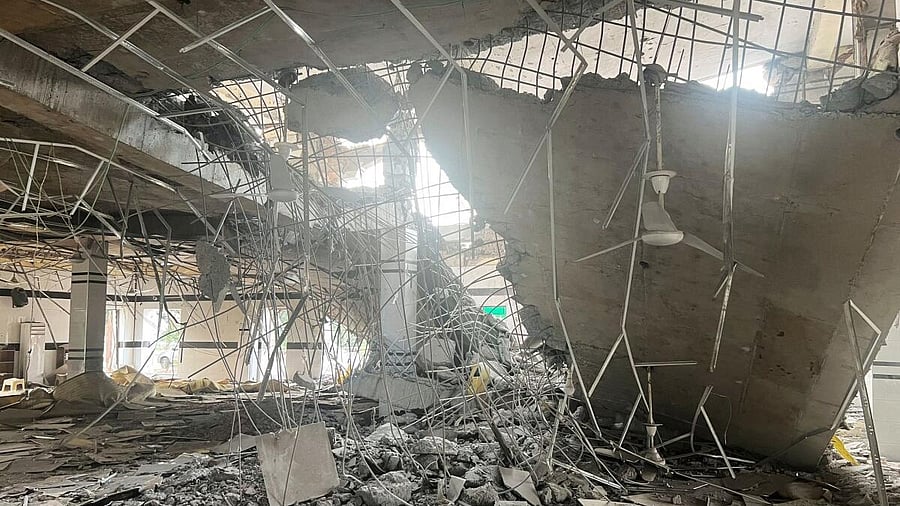
A general view of a damaged portion of a mosque, after it was hit by an Indian strike, in Muridke near Lahore, Pakistan.
Credit: Reuters Photo
New Delhi/Srinagar: The ongoing India-Pakistan hostility sharply escalated further on Thursday as India’s air defence units successfully intercepted a series of missile and drone attacks from Pakistan on the western front even as sudden and complete power blackout plunged many cities including Jammu, Srinagar, Pathankot, Amritsar and surrounding regions into darkness late in the evening, triggering alarm.
Defence sources said eight missiles were fired from Pakistan directed at Satwari, Samba, RS Pura and Arnia sectors in Jammu and Kashmir, and all had been blocked by India’s air defence units. There are reports of Pakistan attacks on other cities near the western border.
“Military Stations of Jammu, Pathankot and Udhampur in proximity to the International Boundary, in Jammu & Kashmir were targeted by Pakistan using missiles and drones. There were no losses and threats were neutralised by armed forces as per the Standard Operating Procedure with kinetic & non-kinetic means,” Headquarters Integrated Defence Staff said in a statement.
Eyewitnesses in Jammu described bright flashes and projectile trails streaking across the night sky, fuelling fears of an incoming missile strike. The chaos was compounded by loud explosions and the sound of air raid sirens in multiple localities.
In Srinagar and other parts of Kashmir, a complete blackout was enforced after missile and drone strikes in Jammu. A blackout was enforced in Punjab's Pathankot and Amritsar districts, while a loud sound, likely of shelling, was heard in Jaisalmer.
Following the evening attacks, Defence Minister Rajnath Singh reviewed the security situation with Chief of the Defence Staff Gen Anil Chauhan and the three Service Chiefs.
News agency ANI reported that a Pakistani Air Force jet has been shot down in the Pathankot sector, but there was no confirmation from the government.
Defence sources said Pakistan drone attacks were reported at various locations along the western borders and they were being effectively engaged by Indian air defence systems.
The fresh flurry of attack from Pakistan comes hours after Indian armed forces thwarted Pakistani attempts to penetrate 15 military establishments on the western front - 13 of them are Indian Air Force bases - with drones and missiles, resulting in Indian counter-strikes that led to neutralisation of an air defence system at Lahore.
Defence sources said visuals over Jammu is an exact reminder of Hamas style attack on Israel using multiple cheap rockets, suggesting how the Pakistan Army was behaving like a terror outfit like Hamas that met with Pakistan’s ISI last month.
On Thursday morning Indian armed forces targeted air defence radars and systems at a number of locations in Pakistan. “Indian response has been in the same domain with the same intensity as Pakistan. It has been reliably learnt that an air defence system at Lahore has been neutralised,” the Defence Ministry said here.
The Indian action stems from Pakistan’s last night’s coordinated attack on Awantipura, Srinagar, Jammu, Pathankot, Amritsar, Kapurthala, Jalandhar, Ludhiana, Adampur, Bhatinda, Chandigarh, Nal, Phalodi, Uttarlai, and Bhuj military stations using drones and missiles.
While Jalandhar is the headquarters of Indian Army’s XI Corps, Kapurthala has a cantonment. The rest are all critical air force stations close to the western border.
“On the night of May 7-8, Pakistan attempted to engage the military targets in northern and western India, but their attempts were neutralised by the integrated counter unmanned aerial system grid and air defence systems. The debris of these attacks is now being recovered from a number of locations that prove the Pakistani attacks,” the ministry said in a statement.
The escalation comes a day after India launched Operation Sindoor hitting at nine terror camps inside Pakistan Occupied Kashmir and Pakistan including the headquarters of Jaish-e-Mohammed and Lashkar-e-Taiba to avenge the Pahalgam massacre in which 25 Indians and one Nepali citizen was killed by terrorists.
Addressing a conclave here, Rajnath said, “In Operation Sindoor, nine terror camps were destroyed in Pakistan and Pakistan occupied Kashmir and a good number of terrorists were killed. It shows the crucial role quality plays in securing national interests.”
The ministry said Pakistan enhanced the intensity of firing across the LoC, killing 16 people including three women and five children. Also 59 people were injured and a Gurdwara was damaged.
“Pakistan has increased the intensity of its unprovoked firing across the Line of Control using mortars and heavy calibre artillery in Kupwara, Baramulla, Uri, Poonch, Mendhar and Rajouri sectors in Jammu and Kashmir. India was compelled to respond to bring Mortar and Artillery fire from Pakistan to a halt,” it said.
Indian armed forces, the ministry said, reiterate their commitment to non-escalation, provided it is respected by the Pakistani military.
